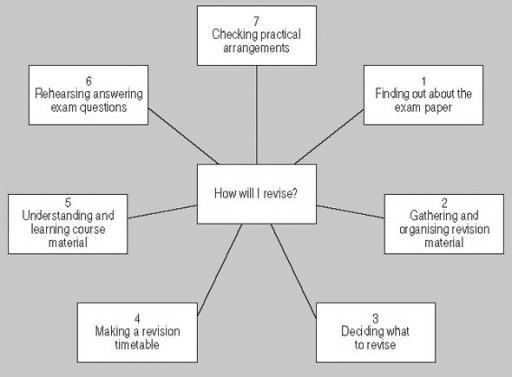Exam Preparation: Revision - How do I get an A?
How do I get an A?
I was asked a question on hubpages that I am asked everyday by my pupils. It boiled down to:
How do I ace my final exams/ How do I get an A
For top marks, you really need to understand your subject. Not only do you need to be able to recall facts, but you need to link ideas, justify positions, contrast ideas, synthesise your own viewpoints - basically everything at the upper end of Bloom's Taxonomy.
How can you guarantee an A. In short it is all down to preparation.
So, just as in revision, switch off your phone, turn off the tv, close your email, tweet your friends that you are going to be unavailable and let's learn how to learn.

How to Prepare for Exams
- Go to all your classes: the most important point, and one that cannot be done retrospectively. Without the information in the first place, what hope do you have of passing. Learning the information from a book is a poor substitute to receving information from an expert in their field, first hand. Books and papers should compliment and supplement lectures, not replace them. If you miss a lecture then see the lecturer/teacher/tutor and try to get replacement notes
- Read around your subject: no substitute for Rule 1! At GCSE this can be using a revision guide; at A level, reading New Scientist; at degree (absolutely vital for the top grades - you cannot access a first without substantial external reading) it is papers from journals linked to your subject. This will improve your understanding and help with synthesis. For degree level, you should be able to quote papers in your answer.
- Revisit immediately: i.e. the end of that day - just read through your notes. Consolidation from short term to long term memory requires a number of steps and information must be revisited regularly early on in this process to secure it. Whilst this may sound labour-intensive, reading and condensing notes at 1 day, 3 day, 1 week, 2 week 1 month intervals will significantly reduce the amount of information you have to relearn in preparation for exams
Simple Revision Strategies

How to Revise for Exams
Once you have the information you need to cement it in your memory. Here are some tips on revision. All of these are useless however, without you metering out your time rationally in a revision timetable. Make a note of the topics you need to know, and by when, then arrange your time (in chunks - see below) according to your priorities.
- Revise with friends: revision can be a dull activity on your own. It can be soul destroying if you let it. They say misery loves company, so get some friends round and work together. Try and teach each other concepts - the greatest demonstration of understanding is correctly teaching another
- Revise in chunks: 20mins with a 10min break. Take a longer break every hour of study (90mins incl. breaks) or so. Studies show that you can only take in a maximum of 7 facts at a time - so don't waste your time trying to remember an entire chapter of a textbook.
- Variety is the key: The link below gives some idea for revising in visual, auditory and kinaesthetic methods. Try to make it fun - make card games (keyword snap) or even board games. Test each other, play who wants to be a millionaire.
- From notes to cards: Condensing information whilst retaining its meaning (to you) shows that your understanding is increasing as is your retention of the facts. Condense your pages onto one page of labelled diagrams (picture=1000words) and bullets. Condense this A4 page to an index card with mini diagrams and smaller bullets. Condense these to topic cards with a few keywords on each. Your brain does not need connectives to make sense of concepts.
- From cards to maps: Use your topic headings as a start for a mindmap. Studies show that mindmapping mimics how the brain processes and stores information - even looking at a mindmap aids retention better than looking at a diagram or page of notes. Once you have your topics, interlink them and add variety - diagrams, cartoons, labels, headings sentences rhymes etc. Then see them regularly - put them up around the house where you are going to pass them frequently
Last Minute Revision Advice
Once you have researched the exam, gained all of the information, started your revision and read around the subject, it is time to practice the exam. Answer as many mock questions as you can lay your hands on. Ask friends to write some for you. Ask post-grads to do some for you. The more practice you get the better. Then mark your own answers. If you don't know where the goalposts are, you cannot score. The more experience you get of writing to the brief of a mark scheme, the more efficient you will get at answering these questions - vital in the pressure cooker that is a 3 hour written exam!
Despite all of my above advice remember this key point you cannot force the information in. If you are really having a mental block, take the work somewhere else or work with someone else. Above all else, you need a good work environment to work in. Be fed, watered, keep a clean, tidy and clear desk with all your pens, paper, bin and books in easy reach.
Keep calm, prepare thoroughly, and remember - exams are less about how much you know, and more about how you apply what you know.
Where Next? Revision
- Get Revising
Get Revising can help you study for your exams - GCSE, AS, A2, International Baccalaureate. Features include a unique revision timetable creator, interactive revision cards, games, and a shared resource library created by our members. - BBC - GCSE Bitesize - Homepage
A secondary school revision resource for students studying their GCSEs featuring written content, interactive content, audio, video and games. - GCSE revision and A level revision | S-cool, the revision website
S-cool Revision is the UK’s leading FREE revision website. We provide high quality A Level and GCSE revision guides, revision questions and revision notes to over 3 million students a year! - LearningSpace - The Open University
Variety in revision techniques. By clicking forward and back, the mindmap above is fully explained. An excellent resource








